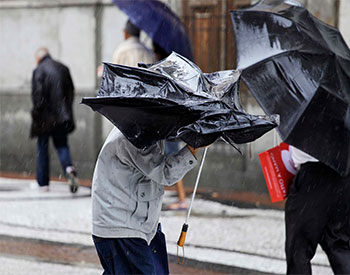
man use a umbrella to protect himself from the rain during a thunderstorm with strong wind in downtown
High Winds
Before High Winds
Survey your property, taking note of materials stored, placed or used which could become missiles and destroy other structures or be destroyed. Devise methods of securing these items where they will still be accessible for day-to-day needs.
Keep trees properly pruned away from power lines.
Keep radio and/or tv on and monitor for wind advisories.
If possible, board up, tape or shutter all windows but leave some ventilation
Store water in case water service is interrupted
Have a supply of flashlights, spare batteries, candles, first aid equipment, medicines, etc. available for use.
Have plastic sheeting available in case roof is damaged and it begins to rain.
Secure outdoor furniture, trash cans, tools, etc.
Take pictures of house/yard, and inside possessions for possible insurance purposes.
During High Winds
Take shelter in hallways and closets; avoid windows.
If outside, take shelter from flying debris.
After Winds Subside
Inspect your home for structural and roof damage.
Check all utilities and power lines for damage and proper operation.
Monitor radio and TV for instructions from local leaders.
Because of its varied terrain and climate, Idaho can experience a variety of sever weather conditions. In a typical year, Idaho can experience everything from blizzards to tornadoes. Winter storms can knock out power and make for slick and icy driving conditions. Avalanches and lightning strikes have claimed the lives of many outdoor adventurers. Flash flooding has caused damage to several areas. Dense fog and windstorms have also caused extensive damage.
